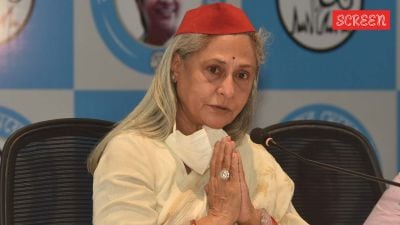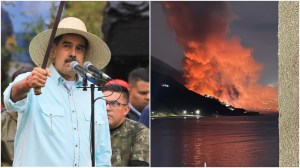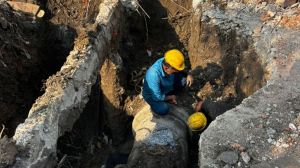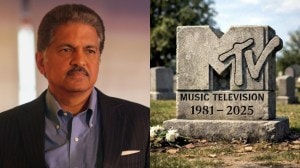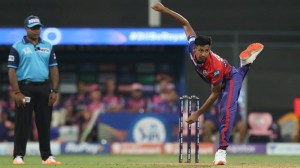Stumbling and lurching along
India and Pakistan are embarked on a three-legged cross-country with the finishing line visible only through a telescope. It will be reached...

India and Pakistan are embarked on a three-legged cross-country with the finishing line visible only through a telescope. It will be reached 8212; but one wonders at what pace. The right leg of one is tied to the left of the other as they move forward, sometimes stumbling, occasionally finding their rhythm, but making gradual progress. During halts for nourishment, if the two steady themselves for photo-ops, it makes for a harmonious picture.
In the latest instance, the runners were preceded by another duo on, say, a golf cart, ordering thickets to be removed for the cross-country to proceed. The two men on the cart are National Security Adviser J.N. Dixit and his counterpart, Tariq Aziz. They are not available for photo-ops. The mystique is heightened. Optimism must be anchored to the unknown being scripted by the pair. Remember, the excruciating suspense on the terrace of the Holiday Inn in Islamabad earlier this year? There was an information vacuum. Journalists were reduced to interviewing each other. Then, on January 6, 2004, Brajesh Mishra and Tariq Aziz announced the Islamabad declaration.
That is when this phase of the three-legged race began. Full marks to the Manmohan Singh government for averting any mean-minded backtracking for partisan reasons. The new government picked up the baton and proceeded. The Indo-Pak process at this stage is proceeding on multiple tracks. Behind the scenes is the script being jointly authored by the two national security advisers. They are receiving inputs from the two establishments and a very active non-governmental second track. The two prime ministers and their respective foreign offices are venturing out into the public domain keeping a steady gaze on three constituencies: domestic, the Kashmir Valley and across the border. The international community is not hovering, distracted as it is by Iraq, but it is around.
Among the hurdles before the peace process are the requirements of the voracious 24-hour news channels and newspapers. I wish there had been a master camera on a crane above that corner of the Taj Mansingh lobby where a battery of cameras had been positioned near the elevators. Word had been put out that Prime Minister Shaukat Aziz, after his meeting with Manmohan Singh, would field a few questions here. What followed was a scramble as in rugby, as all the country8217;s anchors rushed to grab a vantage point where they would catch Shaukat Aziz8217;s eye. I saw one on all fours, crawling between legs and tripods towards a vantage point on the floor, so close to Aziz he could have untied his laces. Oh, the pictures the master camera would have got!
It was probably in such a melee that Pervez Musharraf8217;s famous Id statement was picked up. In this competitive craft, there is just no time to seek clarifications. And when Deputy Secretary of State Richard Armitage endorsed the statement, the spectre of US-Pak conspiracy surfaced. Indeed, Musharraf had talked of Kashmir being divided into seven enclaves under a UN umbrella, or with shared sovereignty, but it was no more than loud thinking, designed to promote internal debate in Pakistan. This is what Aziz said at a breakfast arranged for the media. Indeed there is a positive way to regard Musharraf8217;s musings: his willingness to depart from traditional positions.
At the breakfast meeting, Shaukat Aziz came across as the face of Pakistan Musharraf has been promising post 9/11 8212; enlightened, moderate. He has, by his own admission, worked in 8220;ten countries at the head of big businesses8221;. This was clear from the cogent picture he presented of Pakistan8217;s economic success in the last five years. Pakistan8217;s growth rate will touch 8 per cent in the next few years, he said, and Pakistan8217;s requirements for hydrocarbons was going up. India too needed energy and the Iran-Pakistan gas pipeline8217;s extension to India 8220;would be a win-win for both8221;, he said. But if there was hesitation in New Delhi on this score 8220;we in Pakistan are going ahead, regardless8221;. The three-legged movement requires Petroleum Minister Mani Shankar Aiyar to retard progress on the pipeline to keep pace with the composite dialogue. And the composite dialogue is progressing at its three-legged pace.
Separate orchestration on Kashmir was exemplified by the two PMs, who accorded hospitality to separate sets of Kashmiri leaders. Shaukat Aziz hosted the Hurriyat, including Ali Shah Geelani. Manmohan Singh had Omar Abdullah and Mehbooba Mufti among the guests at his lunch. Aziz8217;s dinner was private. Manmohan Singh8217;s was official. Choreography is significant. Which Kashmiri leaders will be on the first bus that leaves Srinagar, once the Srinagar-Muzzafarabad service is established?
- 01
- 02
- 03
- 04
- 05


